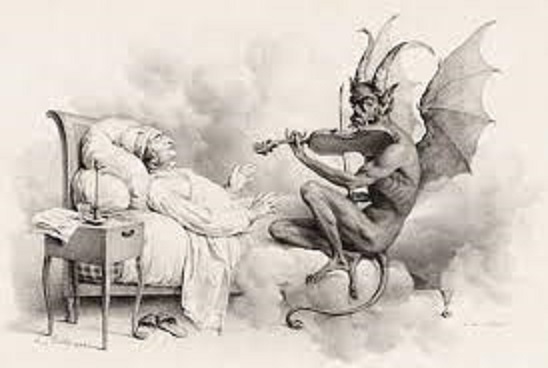Tartini: Devil’s Trill
I read Thomas Mann’s “Dr. Faustus” when I was a teenager. I remember I read the Iwanami paperback in one sitting in three days and three nights. It was a shocking experience. After I finished reading it, I was in a state of complete and utter absent‐minded for a while. It is a novel in the style of a “novel,” in which the life of the main character, composer Adrian Leverkühn, is told by his “best friend,” me. It is said to follow the German tradition of “growth novels (Bildungsroman)”. It is often explained that the author juxtaposed this novel with the devastating German situation during World War II. This is one of the many “Faust legends” in history, and I consider it to be the best of them. I have read this novel only once, and that was because I did not want to read it again. However, the key parts of the story stuck in my head and have not left.
The novel likens the decades-long incubation period of “syphilis”, which the protagonist was infected with when he was young because he bought a prostitute, to a “contracting period” with the devil before it destroys his brain. What a terrifying “set up” of the situation. The scene in which the protagonist has a conversation with the demon at an inn on a trip to Italy (I think he wrote it down in his diary) was truly eerie and frightening. The protagonist received musical “inspiration” from the devil in exchange for his soul, and went on to produce numerous works. The music, however, is not the kind of music that strikes one’s heart. It was inorganic music based on a mathematical theory. It is said that the author borrowed the musical theory developed by the protagonist from Arnold Schönberg. His life, which is invaded by disease and poison, is also said to have been modeled on Friedrich Nietzsche.
Now, one day, his contractual deadline with the devil “ends” abruptly. While playing the piano at home with his friends, the protagonist collapses. He becomes an obedient “shell of a soul” like a child and spends the rest of his life under the protection of his mother. I have never heard of this novel being made into a movie, but I think it would be quite a shocking work if it were made into a film.
As for Tartini’s “Devil’s Trill” now, I listened to several different CDs to compare them. I will not reveal which one I listened to. I was disappointed to find that all of them cheated the trill part in the third movement by using tempo rubato. In my opinion, the best performance of this piece is undoubtedly the one by Eduard Melkus. He plays the trilled part in-tempo and at a frighteningly fast speed. It is incredible. #thomasmann #Faustus #demon #tartini #片山俊幸


